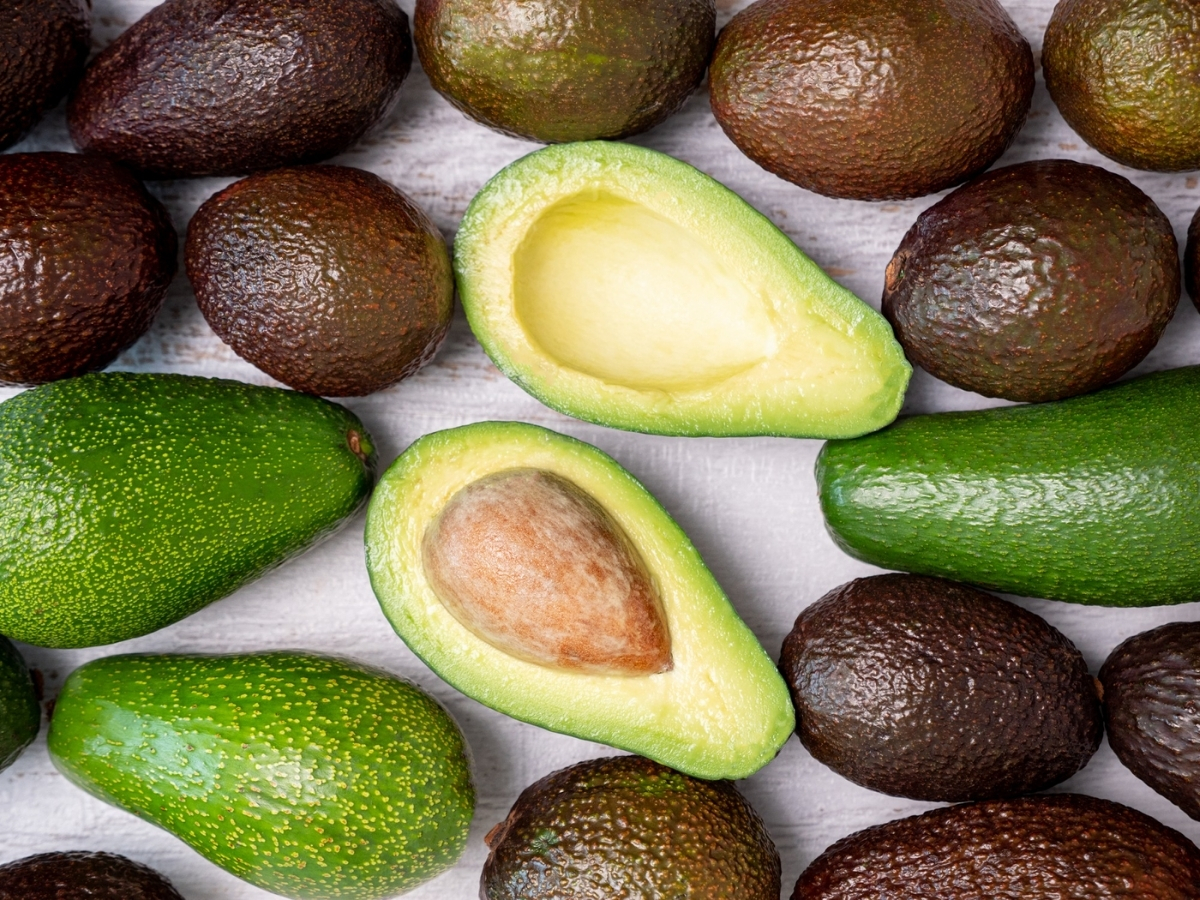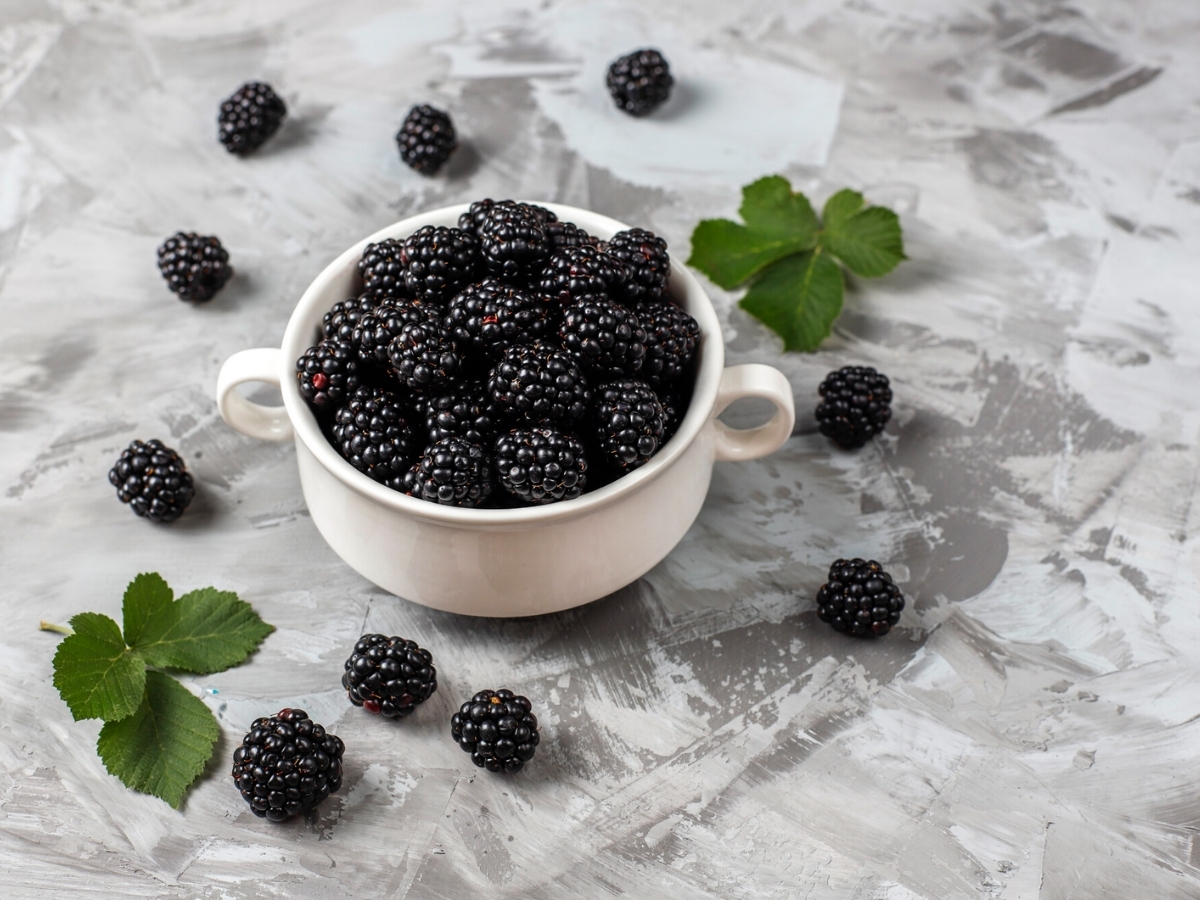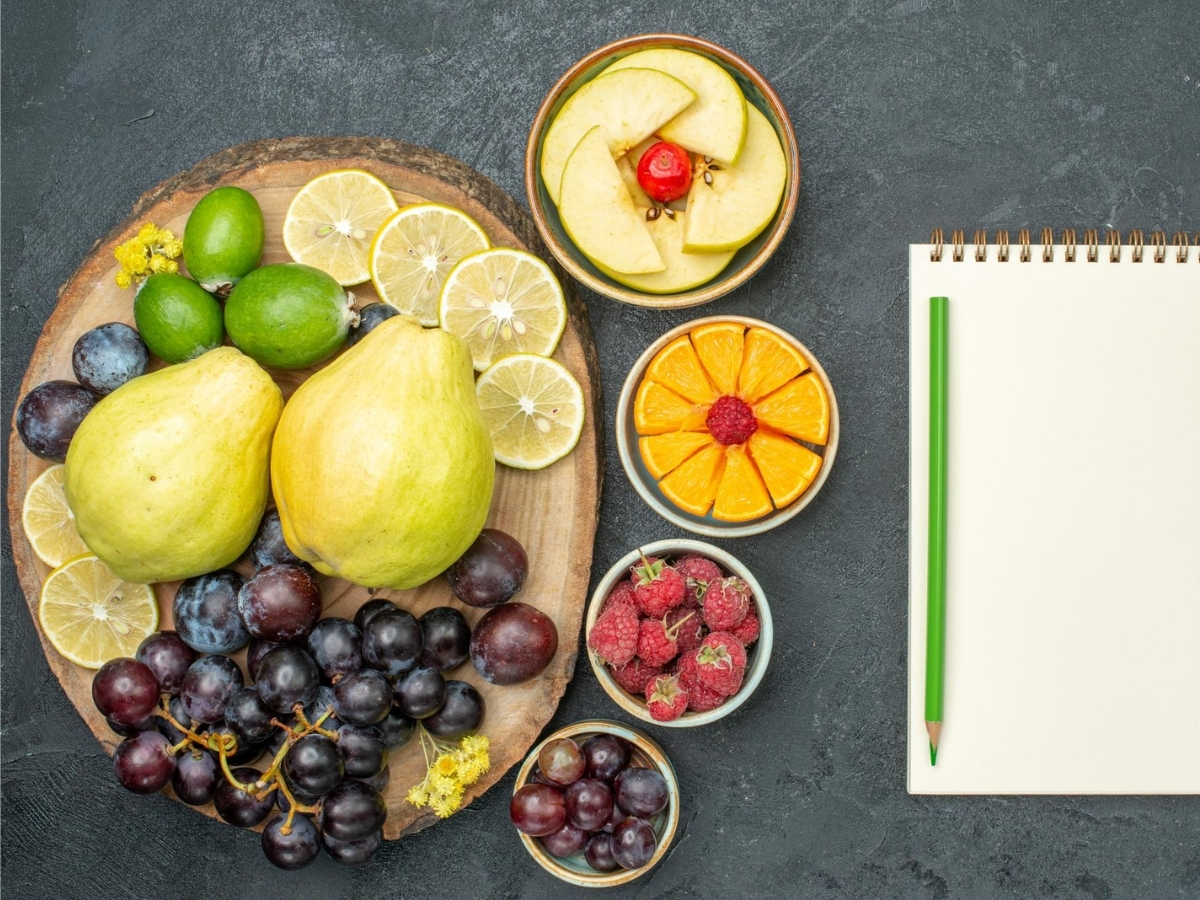At Natural Health, we highlight fruits low in sugar for diabetes that support steady glucose levels while offering antioxidants, fiber, and essential nutrients. This guide features 11+ dietitian-approved fruits that are safe for people with diabetes!
11+Fruits low in sugar for diabetes | Recommended by Dietitians
Not all fruits are diabetes-friendly, but the good news is, there are plenty of delicious options that are naturally low in sugar. Here are 11+ fruits dietitians recommend for better blood sugar control.
Avocado

Avocado stands out for being extremely low in sugar, less than 1 gram per serving.[1] It’s rich in heart-healthy fats and fiber, both of which help slow digestion and prevent blood sugar spikes.[2]
Avocados support insulin sensitivity, promote satiety, and have a glycemic index close to zero.[1]
Limes
Limes are among the lowest-sugar fruits, with only about 1.1 grams of sugar per 100 grams.[3] Their tart flavor makes them a great addition to food and drinks without causing blood sugar spikes. They’re also packed with vitamin C and antioxidants, which support immune function and reduce inflammation.[4]
Why they’re great for diabetes:
- Very low sugar content
- High in fiber (especially pectin, a type of soluble fiber that may help regulate blood sugar)
Lemons
Lemons are extremely low in sugar, only 1.45 grams per 100 grams.[5] And packed with vitamin C and citric acid, which may help reduce blood sugar spikes when consumed with meals.
Lemons are an excellent choice for people with diabetes thanks to their very low natural sugar content. They are also rich in antioxidants, particularly vitamin C, which supports immune health and may reduce inflammation. Moreover, the citric acid in lemons may help lower the glycemic impact of meals by slowing the digestion of carbohydrates.[6]
Read also: 17+ Best fruits good for diabetes & What to Avoid
Raspberries
With only 4.4g of sugar per 100g, raspberries are rich in fiber (8g/100g).[7] And antioxidants like anthocyanins, which may improve insulin sensitivity.[8]
Why they’re great for diabetes:
- High fiber-to-sugar ratio
- Low glycemic index
Cranberries
Fresh cranberries have 4g of sugar per 100g, though dried ones are often sweetened.[9] They’re high in polyphenols and may reduce oxidative stress.[10]
Why they’re great for diabetes:
- Low natural sugar
- Anti-inflammatory properties
Apricot
One fresh apricot has ~3.9g of sugar, and it’s a good source of vitamin A, potassium, and fiber.[11]
Apricots are great for diabetes management because they contain a low amount of natural sugar per fruit, making them a safer choice for blood sugar control.[12] Additionally, they are rich in antioxidants, which help reduce inflammation and support overall metabolic health.[13]
Strawberries
Strawberries contain 4.9g of sugar per 100g[14]. And are rich in vitamin C and anthocyanins, which may help lower blood sugar after meals.[15]
Strawberries are a smart fruit choice for people with diabetes due to their low glycemic index, around 41, which means they cause only a slow, steady rise in blood sugar.[16] Research also suggests that strawberries can help improve post-meal glucose response, making them beneficial for better blood sugar control after eating.[17]
Blackberries

Blackberries have 4.9g sugar/100g, but 5.3g fiber, helping regulate glucose absorption.[18]
This high fiber content helps slow glucose absorption, promoting more stable blood sugar levels. Additionally, blackberries are rich in antioxidants such as vitamin C and vitamin K, which support immune function and help combat inflammation associated with diabetes.[19]
Grapefruit
Half a grapefruit contains about 8.48 grams of natural sugar, which is moderate compared to other fruits.[20]
However, it has a low glycemic index of approximately 22, meaning it causes only a gradual rise in blood sugar levels.[21] Grapefruit is also rich in vitamin C and naringenin, a flavonoid that has been linked to improved insulin sensitivity and better metabolic health, making it a valuable addition to a diabetes-friendly diet.[22]
Honeydew Melon
Contains around 8g sugar/100g.[23] But also provides hydration and potassium.[24]
Why it’s acceptable in moderation:
- Moderate sugar, high water content
- Refreshing, low calorie
Papaya
Papaya contains approximately 5.9 grams of sugar per 100 grams, which is relatively low compared to many other tropical fruits.[25]
It’s also a rich source of vitamin C, beta-carotene, and natural enzymes like papain that aid digestion. Thanks to its anti-inflammatory properties and lower sugar content, papaya can be a suitable and nutritious option for people managing diabetes.[26]
Kiwi
Kiwi contains about 6.2 grams of sugar per 100 grams, along with 2 to 3 grams of fiber, making it a moderately sweet yet fiber-rich fruit.[27]
It’s also packed with vitamin C and actinidin, a natural enzyme that supports digestion. With its balance of moderate sugar, high nutrient content, and potential benefits for gut health, kiwi is a smart and refreshing choice for people with diabetes.[28]
How are fruits important for diabetes?

Fruits play an essential role in a diabetes-friendly diet, not just because they’re natural sources of sweetness, but because many of them provide unique health benefits that help regulate blood sugar. The key is choosing the right types, specifically, fruits low in sugar for diabetes, which offer nutritional advantages without causing blood sugar spikes.
Fruits that are beneficial for diabetes typically have:
- Low sugar content: These help prevent sudden spikes in blood glucose.[29]
- Low glycemic index (GI): A low GI means the fruit causes a slower, steadier rise in blood sugar.[30]
- High fiber: Especially soluble fiber, which slows carbohydrate absorption and improves insulin response.[31]
- Rich in antioxidants and vitamins: Such as vitamin C, beta-carotene, and polyphenols, which reduce inflammation and support overall metabolic health.[32]
Healthy Ways to Eat Fruits For Diabetes
For people with diabetes, the key to enjoying fruit is all about portion control, smart pairing, and choosing the right types, especially fruits low in sugar for diabetes. Here are some healthy ways to include fruit in a diabetes-friendly diet:[33]
- Choose fruits low in sugar and glycemic index: Go for options like berries, kiwi, avocado, or citrus fruits like lemons and limes. These cause a slower rise in blood sugar and are rich in fiber and antioxidants.
- Eat whole fruits instead of juice: Whole fruits retain fiber, which slows down sugar absorption. Fruit juice, even 100% juice can cause a rapid spike in blood glucose.
- Watch your portions: Stick to single servings (e.g., ½ banana, ¾ cup berries, 1 small apple) to keep your carbohydrate intake in check.
- Pair fruits with protein or healthy fat: Combine fruit with yogurt, nuts, or cheese. This helps stabilize blood sugar and prolong satiety.
- Avoid dried fruits with added sugar: Some dried fruits are highly concentrated in sugar and often sweetened. If you eat dried fruit, choose unsweetened and eat in small amounts.
- Time your fruit intake wisely: Eating fruit as part of a balanced meal or as a snack between meals is better than eating it alone on an empty stomach, which may spike blood sugar more quickly.
Do you know: What foods to avoid with diabetes?
Frequently asked questions
What fruit has the least sugar for diabetics?
Among all fruits, avocado has the least sugar, less than 1 gram per 100 grams, making it one of the best choices for people with diabetes.[1]
What is the miracle fruit for type 2 diabetes?
One of the most often referred to as a ‘miracle fruit’ for type 2 diabetes is the avocado, thanks to its extremely low sugar content, high fiber, and healthy fats that improve insulin sensitivity. Similarly, berries, especially raspberries and blackberries, are also highly recommended for their rich antioxidant content and high fiber, both of which support blood sugar control.
What fruit does not raise blood sugar?
Fruits that have minimal impact on blood sugar when eaten in moderation include:
- Limes and lemons: extremely low in sugar and glycemic load
- Berries (especially raspberries and blackberries): high in fiber and antioxidants
- Fresh cranberries: low sugar and anti-inflammatory benefits
At Natural Health, we emphasize the importance of selecting fruits low in sugar for diabetes as part of a balanced, nutrient-rich diet. With the right fruits, you don’t just manage blood sugar, you support your long-term health, one step and one bite at a time.


Last medically reviewed on
How we reviewed this article:
References
[1] Avocados, raw, all commercial varieties; U.S. Department of Agriculture Agricultural Research Service; 2019
[2] AVOCADO: THE HOLISTIC SOURCE AS A NATURAL DOCTOR!; Pavan Chaudhary, Jainik Khamar and Prof. Dr. Dhrubo Jyoti Sen; 2015
[3] Limes, raw; U.S. Department of Agriculture Agricultural Research Service; 2019
[4] Effects of Citrus Fruit Juices and Their Bioactive Components on Inflammation and Immunity: A Narrative Review; Elizabeth A Miles, Philip C Calder; 2021
[5] Lemons, raw, without peel; U.S. Department of Agriculture Agricultural Research Service; 2019
[6] Lemon juice, but not tea, reduces the glycemic response to bread in healthy volunteers: a randomized crossover trial; Daniela Freitas, François Boué, Mourad Benallaoua, Gheorghe Airinei, Robert Benamouzig, Steven Le Feunteun; 2020
[7] Raspberries, raw; U.S. Department of Agriculture Agricultural Research Service; 2019
[8] Berry Phenolic Antioxidants – Implications for Human Health?; Beata Olas ; 2018
[9] Cranberries, raw; U.S. Department of Agriculture Agricultural Research Service; 2019
[10] Cranberry antioxidant power on oxidative stress, inflammation and mitochondrial damage; Ana Paula Caldas, Olivia Coelho, Josefina Bressan; 2018
[11] Apricots, raw; U.S. Department of Agriculture Agricultural Research Service; 2019
[12] A Review with Updated Perspectives on Nutritional and Therapeutic Benefits of Apricot and the Industrial Application of Its Underutilized Parts; Maryam Haroon Al-Soufi,Hussah Abdullah Alshwyeh,Haifa Alqahtani,Safa Khalil Al-Zuwaid,Fatimah Othman Al-Ahmed,Fatima Taher Al-Abdulaziz 1ORCID,Daniya Raed,Khaoula Hellal,Nurul Hidayah Mohd Nani,Siti Norliyana Zubaidi,Nurul Syahidah Mio Asni,Hamizah Shahirah Hamezah,Nurkhalida Kamal,Hessah Al-Muzafar and Ahmed Mediani; 2022
[13] APRICOT: NUTRITIONAL POTENTIALS AND HEALTH BENEFITS-A REVIEW; Sartaj Ali, Tariq Masud, Kashif Safraz Abbasi,Talat Mahmood, Azhar Hussain; 2015
[14] Strawberries, raw; U.S. Department of Agriculture Agricultural Research Service; 2019
[15] Effects of acute strawberry consumption on serum levels of vitamin C and folic acid, the antioxidant potential of LDL and blood glucose response: a randomised cross-over controlled trial; Yoshimi Kishimoto, Chie Taguchi, Tomomi Iwashima, Toshihiro Kobayashi, Yutaka Kikoku, Hiroshi Nishiyama, Yasunobu Masuda, Kazuo Kondo; 2023
[16] 10 low glycemic fruits for diabetes; Diabetes Care Community; 2023
[17] Effects of Acute Dietary Polyphenols and Post-Meal Physical Activity on Postprandial Metabolism in Adults with Features of the Metabolic Syndrome; Dustin W Davis,James W Navalta,Graham R McGinnis,Reimund Serafica,Kenneth Izuora 3ORCID andArpita Basu; 2020
[18] Blackberries, raw; U.S. Department of Agriculture Agricultural Research Service; 2019
[19] Blackberries and Mulberries: Berries with Significant Health-Promoting Properties; Mariana S Martins, Ana C Gonçalves, Gilberto Alves, Luís R Silva; 2023
[20] Grapefruit, raw, pink and red, all areas; U.S. Department of Agriculture Agricultural Research Service; 2019
[21] Grapefruit; Glycemic Index Guide
[22] HEALING FOODS: Practical Guide to the Health Benefits and Medicinal Uses of Food; Naya Lizardo
[23] Melons, honeydew, raw; U.S. Department of Agriculture Agricultural Research Service; 2019
[24] Antioxidant, Sugar, Mineral, and Phytonutrient Concentrations across Edible Fruit Tissues of Orange-Fleshed Honeydew Melon (Cucumis melo L.); Gene E. Lester; 2008
[25] Papayas, raw; U.S. Department of Agriculture Agricultural Research Service; 2019
[26] Phenolic and Metabolic Profiles, Antioxidant Activities, Glycemic Control, and Anti-Inflammatory Activity of Three Thai Papaya Cultivar Leaves; Sirinet Chaijan,Manat Chaijan,Umaporn Uawisetwathana,Atikorn Panya,Natthaporn Phonsatta,Kalidas Shetty and Worawan Panpipat; 2024
[27] Kiwi fruit, raw; U.S. Department of Agriculture Agricultural Research Service; 2019
[28] Actinidia deliciosa (Kiwi fruit): A comprehensive review on the nutritional composition, health benefits, traditional utilization, and commercialization; Dolly Satpal, Jaspreet Kaur, Vishesh Bhadariya, Kartik Sharma; 2021
[29] Glucose Revolution: The Life-Changing Power of Balancing Your Blood Sugar; Jessie Inchauspe
[30] Review on low glycaemic index functional food
products; Shristi Murarka and Sury Pratap Singh ; 2023
[31] Effects of Dietary Fiber and Its Components on Metabolic Health; James M. Lattimer andMark D. Haub; 2010
[32] Update on the Biological Characteristics of the Antioxidant Micronutrients: Vitamin C, Vitamin E, and the Carotenoids; CHERYL L. ROCK PhD, RD, FADA, ROBERT A. JACOB PhD, PHYLLIS E. BOWEN PhD, RD; 1996
[33] How do fruit and vegetables prevent heart disease and type 2 diabetes?; Clifton, Peter M.; Petersen, Kristina S.; Blanch, Natalie; Keogh, Jennifer B.; 2014
Share this article
Read this next
Is water lemon good for diabetes? What should you know
Lemon water is good for diabetes, not just because it’s refreshing, but because it offers real support for blood sugar control. With zero added sugar, rich in vitamin C and antioxidants, it may help improve hydration, aid digestion, and reduce post-meal blood sugar spikes. At Natural Health, we break down how to make lemon water…
Apple cider vinegar for diabetes: The research says and tips to use
At Natural Health, we explore the growing interest in apple cider vinegar for diabetes. Studies suggest it may help improve insulin sensitivity and lower blood sugar levels after meals. This article explains how apple cider vinegar works, how to use it safely, and what people with diabetes need to know before adding it to their…
Is sweet corn good for diabetes? Dietitians explain
At Natural Health, we know many people managing blood sugar often ask, is sweet corn good for diabetes? The short answer: YES, with the right portion. Corn contains fiber, vitamins, and antioxidants that support overall health. In this guide, we break down how corn fits into a diabetes-friendly diet and how to enjoy it without…